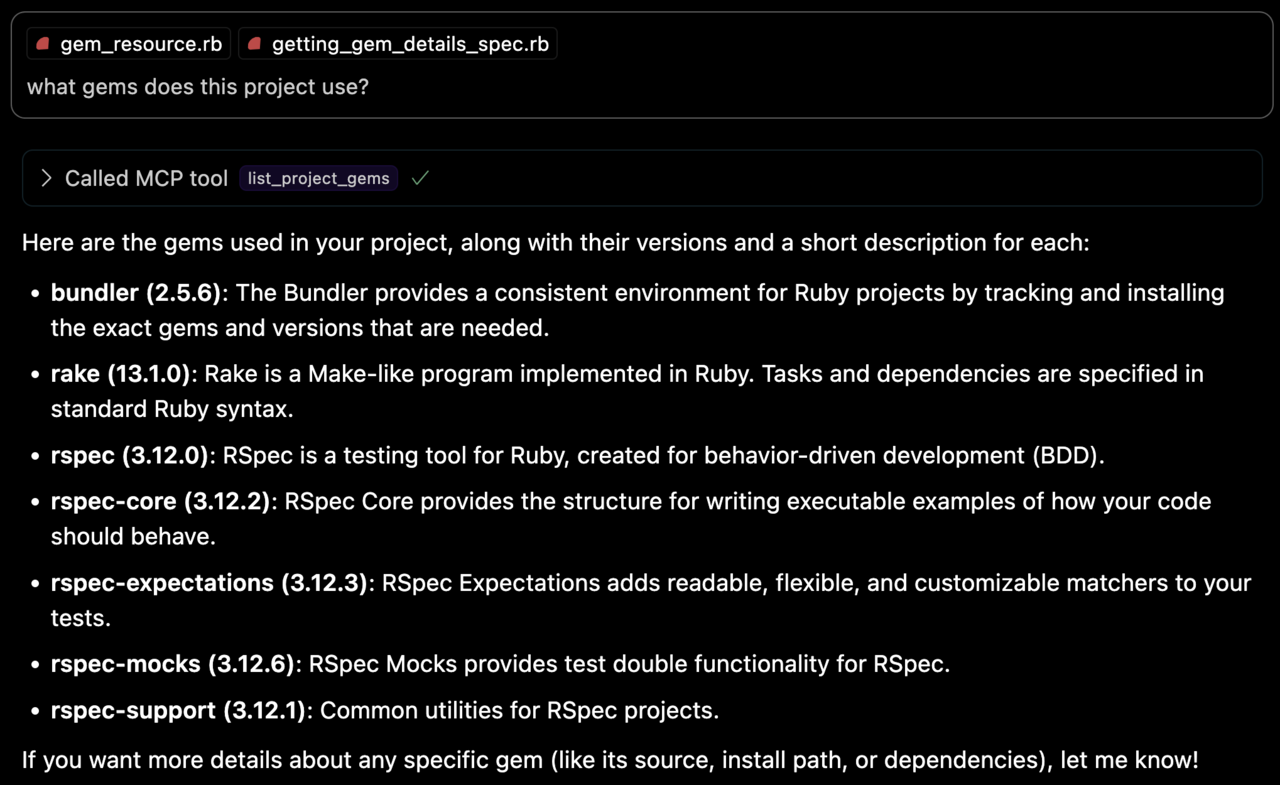About
A Model Context Protocol server that lets AI agents query a Ruby project's Gemfile for gem listings and detailed metadata, simplifying dependency analysis and documentation retrieval.
Capabilities

Overview
BundlerMCP is a lightweight Model Context Protocol server that bridges the gap between AI assistants and Ruby dependency management. It exposes structured information about a project’s —the central declaration of Ruby libraries—to agents that can query, analyze, and act on this data. By turning the otherwise opaque dependency graph into a machine‑readable API, developers can let AI assistants provide instant insights into gem versions, documentation locations, and installation paths without manually inspecting files or running .
What Problem It Solves
Managing Ruby dependencies can become tedious, especially in large or legacy projects. Developers often need to answer questions like “Which version of is being used?” or “Where can I find the README for ?” manually. BundlerMCP automates these lookups, giving AI assistants a reliable source of truth. This reduces context‑switching and speeds up debugging, code reviews, or onboarding new contributors who need to understand the current gem landscape quickly.
Core Functionality and Value
The server offers two primary tools:
- – Returns a catalog of all bundled gems, including version numbers, short descriptions, installation paths, and links to top‑level documentation such as README or CHANGELOG files.
- – Provides granular information for a single gem, adding source‑code file locations to the basic metadata.
These tools translate complex Bundler data into simple JSON structures that AI agents can consume. Because the server is built on , it delivers low‑latency responses and can be integrated into any MCP‑compatible workflow, from Claude’s “Tool Calling” to Cursor’s prompt engineering.
Real‑World Use Cases
- Automated Dependency Audits – An AI assistant can list all gems, flag outdated or insecure versions, and suggest updates.
- Onboarding Support – New team members can ask an agent for a quick overview of the project’s dependencies and receive links to relevant documentation.
- Continuous Integration – CI pipelines can query the MCP during builds to verify that the Gemfile.lock matches expected versions or to enforce policy checks.
- Code Generation – When generating new Ruby code, an assistant can suggest the correct gem to import based on existing dependencies.
Integration with AI Workflows
BundlerMCP is configured via a simple JSON file that points the client to the server’s binstub. Once registered, any MCP‑aware agent can invoke or as part of a larger conversation. The server respects environment variables such as , allowing it to work with non‑standard Gemfile locations or multi‑environment setups. Logging can be enabled for debugging, making it easy to trace agent interactions during development or production runs.
Unique Advantages
- Zero Configuration for Standard Projects – A single binstub is enough; no need to write custom adapters or parsers.
- Rich Metadata – Beyond version numbers, the server exposes documentation paths and source locations, giving agents actionable data.
- Fast‑MCP Foundation – Built on a proven lightweight framework, the server delivers quick responses even in large dependency trees.
- Open‑Source and Extensible – The gem’s source is publicly available, allowing teams to fork or extend functionality for specialized tooling.
BundlerMCP empowers developers to harness AI assistants as knowledgeable collaborators that understand the intricacies of a Ruby project’s dependency ecosystem, streamlining maintenance, onboarding, and automation across the development lifecycle.
Related Servers
n8n
Self‑hosted, code‑first workflow automation platform
FastMCP
TypeScript framework for rapid MCP server development
Activepieces
Open-source AI automation platform for building and deploying extensible workflows
MaxKB
Enterprise‑grade AI agent platform with RAG and workflow orchestration.
Filestash
Web‑based file manager for any storage backend
MCP for Beginners
Learn Model Context Protocol with hands‑on examples
Weekly Views
Server Health
Information
Explore More Servers
Freshservice MCP Server
AI-powered ITSM operations via Freshservice integration
Claude MCP Server Test
Test server with coming soon page and countdown timer
PrivateGPT MCP Server
Secure, modular agent orchestration for private LLM interactions
Algolia MCP Server
Experimental MCP interface for Algolia APIs
Mcp Delete
Securely delete files via AI-powered MCP server
Probo MCP Server
MCP wrapper for Probo printing services